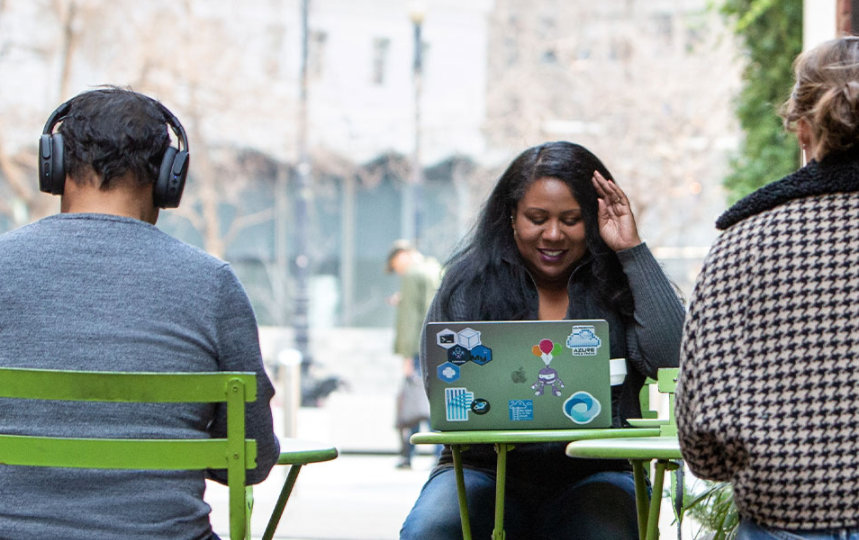Racial Equity Initiative
We are committed to helping address racial injustice and inequity in the US for Black and African American communities. The commitments we outlined in June 2020 are actions and progress we expect to make or exceed by 2025.
Our commitments
In June 2020, Microsoft made a multiyear commitment to address racial injustice and inequity, but the work doesn’t stop there. The Racial Equity Initiative focuses on three efforts:

Strengthening our communities
We are using data, technology, and partnerships to help improve the lives of Black and African American people in the US, including our employees and their communities.

Increasing representation & strengthening inclusion
We are building on our momentum with an additional $150 million investment to strengthen inclusion and double the number of Black and African American, Hispanic, and Latinx leaders in the US by 2025.

Engaging our ecosystem
We are using our balance sheet and relationships with suppliers and partners to foster societal change and create new opportunity.
2023 Global Diversity & Inclusion Report
This report measures progress on our commitments to increase representation and strengthen a culture of inclusion at Microsoft and beyond.
Learn more about our commitments

Justice reform
We are working to empower communities by advancing racial equity and fairness in the justice system. We partner with organizations using data and technology to help prevent unnecessary justice system involvement and eliminate racial disparities in policing and prosecution practices.

Nonprofits
Using technology, we are empowering digital transformation for nonprofits that help Black and African American communities. This supports nonprofits in their mission tied to the communities they serve.

Broadband connectivity
We are working with partners to expand internet access and meaningful connectivity through adoption of affordable broadband, devices, and digital skills within Black and African American communities across 14 geographies, including the Black Rural South.

Skills and education
We are expanding our work to help Black and African American students and adults develop the skills needed in the digital economy. As a part of this effort, we are strengthening our support for Historically Black Colleges and Universities (HBCUs).
Progress to date
We are committed to working towards long-term systemic change. Learn more about our progress to date below and in our 2023 Racial Equity Initiative Report.
Justice reform
In June 2020, we committed $50 million over five years to strengthen and expand our existing Justice Reform Initiative. To date, we’ve established more than 130 distinct partnerships with more than 100 unique organizations, working to provide alternatives to incarceration, accelerate innovative models of public safety, and expand access to data-driven insights. Together, these organizations have improved access to data-driven insights in more than 200 communities across the US, which led to implementation policy or practice changes in many of these communities.
As part of our commitment to expanding access to data-driven insights, for example, we support Prosecutorial Performance Indicators which is working with eight District Attorney’s offices in Colorado to help identify opportunities to proactively reduce racial and ethnic disparities. Colorado is the first state in the country to have multiple prosecutors’ offices working together to proactively provide an in-depth data analysis to identify and prioritize actions that can be taken at points of prosecutorial discretion to make sure defendants and victims are treated fairly. To ensure accountability, each office identified key takeaways and a set of next steps based on the analyses. For instance, one jurisdiction submitted a proposal to further expand diversionary programs as a result of the analysis, which can have significant long-term impacts on public safety, crime rates, and overall cost efficiencies.
Nonprofits
We grew our Nonprofit Tech Acceleration for Black and African American Communities program, which uses data, technology, and partnerships to help more than 2,300 local organizations across the country modernize and streamline operations with technical solutions including licensing, discounts, implementation consulting and concierge services.
The program works with organizations large and small at all stages, including startup nonprofits. To date, we have helped more than 2,600 local organizations across more than 1,700 communities accelerate their missions and drive greater impact through digital transformation. We’re currently tracking towards our long-term goal of helping more than 25,000 nonprofits.
Broadband connectivity
Our partnerships and projects drive adoption of affordable broadband services, computing devices, and digital literacy across 14 geographies—Atlanta, Baltimore, Birmingham, Charlotte, Cleveland, Detroit, El Paso, Los Angeles, Memphis, Milwaukee, New York and rural Alabama, North Carolina, and Virginia.
Using the power of Microsoft’s data and technology, our new Digital Equity Data Dashboard enables policymakers to identify broadband gaps and target public investments for communities most in need, including state broadband offices such as Louisiana (“Connect Louisiana”) and Michigan (Michigan High-Speed Internet Office).
Some of the largest broadband gaps are fueled by lack of affordable service options. The FCC’s Affordable Connectivity Program (ACP) is a powerful tool to help address the affordability challenge. To increase awareness and enrollment in the ACP, we collaborated with Communications Workers of America marshaling Microsoft employees and partners to implement a five-city event series entitled, “Get Connected,” leaning into new funding to address affordability. Local and national nonprofit partners, such as EveryoneOn, United Way of Greater Milwaukee, and Black Churches 4 Digital Equity, a Multicultural Media, Telecom, and Internet Council (MMTC) coalition, also convened affordable broadband enrollment events and digital skills for adoption programs.
Driving connectivity efforts further—Airband partners are using the power of connectivity to deliver digital solutions for community-specific challenges. In Charlotte, Airband partner Open Broadband provides connectivity for Black-owned firm Druid to use the power of Azure to address food insecurity. We are also working with Historically Black Colleges and Universities (HBCUs), which are important anchor institutions, to use connectivity to digitally transform surrounding neighborhoods that are often broadband deserts. As part of this work, in the Black Rural South, our HBCU project with Tuskegee University (AL) offers no-cost, virtual telemedicine access on-campus for students, faculty, and residents, while Prairie View A&M University (TX) leverages their precision agriculture research capabilities using Azure-based platforms.
Skills and education
Through our Technology Education and Learning Support (TEALS) program, we have expanded access to computer science education in more than 500 schools across 21 racial equity expansion regions providing computer science education to high school students with the support of more than 10 percent of the 1,500+ volunteers identifying as Black and African American for the 2022-2023 school year.
We completed the third year of programming for 50 nonprofit workforce development and digital skilling groups led by and serving Black and African American communities accounting for $15 million in grants, capacity-building support, and tech enablement services that have reached nearly 40,000 people.
Of the 50 organizations, 49 were new grantees to Microsoft, including the Hidden Genius Project in Oakland, which trains and mentors young Black men in technology creation and entrepreneurship; and TechBridge in Atlanta, which aims to break the cycle of poverty through the innovative use of technology.
We have also given $10 million in grants to 18 HBCUs and associations to support curriculum development, student scholarships and mentoring, faculty training, and virtual learning.

Culture of inclusion
We are accelerating our cultural transformation through further investment in inclusion as required learning for all employees on allyship, covering and privilege, and focused resources and conversations for managers and leaders on unique workplace issues facing the Black and African American and Hispanic and Latinx communities.

Career planning and talent development
We are strengthening our intentional career planning and talent development efforts across our entire workforce through holistic efforts. This includes creating and expanding leadership development programs, to enable employees to learn, explore across professional opportunities and leadership excellence, and thrive.

Accountability for progress
We are deepening our practice of evaluating each partner's and executive's progress on D&I when determining their impact, rewards, and promotions; providing executives with coaches to confront obstacles to inclusion within their teams; and continuing to stay focused on representation at all levels of Microsoft where we see a talent gap to market.
Progress to date
We are committed to working towards long-term systemic change. Learn more about our progress to date below in our 2023 Global Diversity & Inclusion Report and in our 2023 Racial Equity Initiative report.
Culture of inclusion
Strengthening a culture of inclusion is about a company-wide, sustained focus on understanding and practicing the behaviors that can improve the lived experience for all employees at Microsoft. Shared language and shared understanding go a long way in building the foundation for those culture shifts.
This year, the average Microsoft employee completion rate was 99% overall for required D&I learning courses on allyship, covering, privilege, and unconscious bias in the workplace. And while required learning consumption remained high, there was more than a 270% increase in employees taking optional courses that allow them to explore topics such as interrupting microaggressions and breaking down barriers to create more inclusive workplaces.
The Race and Ethnicity Learning Path was introduced as a personalized, voluntary learning experience enabling employees to take ownership of their D&I learning journey. We also launched specific content on being an Informed Ally via an experience that provokes moments of reflection, activation of basic inclusive behaviors, and drives commitment to action. Most recently, we added new interactive D&I Simulations where learners can practice skills acquired through other D&I learning solutions.
The people manager community is making progress for required learning and discussions on D&I. As we strive to increase manager capability on inclusion, we are curating learning & enablement content to allow them to be successful in a hybrid environment.
Microsoft’s Inclusion is Innovation site conveys our unwavering commitment to directly address the systemic and cultural complexity of diversity and inclusion by showcasing the impact employees have when they can thrive.
Additionally, Microsoft’s Inclusion Journey site features thought leadership videos from external experts who speak to how we can leverage our resources. This is to help accelerate diversity & inclusion across our ecosystem and create a culture of inclusion for our employees.
Career planning and talent development
Microsoft supports legal practices throughout our talent motions that help build workforces with a range of backgrounds, skills, and experiences, foster innovation, and serve business and customer needs.
We are unwavering in our efforts toward advancing representation at all levels where we see a talent gap to market, and it is even more critical now that we prioritize internal development and growth. Growing global networks, enhancing business acumen, building skills, and leadership development have never been more important. With that in mind, we continue to invest in leadership development programming internally and partnerships externally that give employees a variety of options throughout their careers to learn and explore across professional opportunities.
Aligned to our commitment to ensure equitable access to opportunity, part of our work is to provide robust and holistic leadership development options available to Microsoft employees. These opportunities help deepen understanding of career options and pathways, supported by managers who are invested in the success of all employees thriving at Microsoft.
Accountability for progress
Sustained progress on representation requires deep accountability at the most senior levels of the company. Over the last five years, Microsoft has increased representation across demographics and levels. We continue to report externally on our progress annually, most recently in our Global Diversity & Inclusion Report with both a report document and associated video to share progress on our commitments to work toward long-term systemic change.
To accelerate progress, we are providing external coaches to executives. Since the initial coaching pilot was completed in FY21, more than 115 executives have participated in this program to date with more planned.
We are focused on enhancing the hiring and interview processes to include discussions on both culture and inclusion for management positions and employee hiring broadly. In FY23, we launched an updated Inclusive Hiring Training available to interviewers and managers.
We have made meaningful progress toward fulfilling our commitment to double the number of Black and African American and Hispanic and Latinx leaders in the US by 2025.
As of June 2023, we are 93 percent of the way to our goal for Black and African American people managers (below director level), and 107.8 percent of the way for Black and African American directors+ (people managers and individual contributors). Additionally, we are 27.3 percent of the way for Hispanic and Latinx people managers (below director level), and 74.8 percent of the way for Hispanic and Latinx directors+ (people managers and individual contributors).
Our progress on growing director+ representation is meaningful and driven by a number of intentional efforts: investments in leadership development programs, key talent management motions, and a focus on career development by managers across the company. While we are encouraged by this progress, our commitment continues to be advancing representation at all levels where we see a talent gap to market.
Through our company-wide One Microsoft Diversity & Inclusion Plan, we are amplifying, accelerating, and activating a diverse and inclusive workplace. The Plan outlines priorities and company-wide expectations for all employees, managers, and executives, enabling action for impact across our geographies and organizations and holding us accountable to our commitments.

Broadening our work with suppliers
We are doubling the number of Black and African American-owned approved suppliers, spending an incremental $500 million with those existing and new suppliers, and encouraging representation progress in our top 100 suppliers.

Investment in financial institutions
We are growing our portfolio investment with Black and African American-owned financial institutions and investing to increase funds in local communities, improve access to capital, increase skill development, and reduce technology gaps.

Partner investment
We are investing to increase the number of Black and African American owned partners in the US to improve access to capital, provide financing to support cash flow needs, and implement training programs.
Progress to date
We are committed to working towards long-term systemic change. Learn more about our progress to date below in our 2023 Racial Equity Initiative Report.
Broadening our work with suppliers
We have achieved our goal of increasing spend with Black and African American-owned suppliers by $500 million with double the number of suppliers. We recognize our work here is not done, and we remain focused on growing our utilization of diverse-owned suppliers to sustain our progress and strengthen the relationships we’ve forged.
We’re continuing to encourage diverse representation progress in our top 100 suppliers, which account for a significant portion of our indirect spend. We now have 90 percent of these top 100 suppliers participating in a voluntary D&I self-assessment program. We have also launched an online community to encourage best practice sharing and will continue to work closely with our top strategic suppliers to create opportunities in support of diverse-owned suppliers.
To ensure new suppliers are ready for business and receive adequate resources and support to be successful at Microsoft, we have implemented a program called AMP’D (Advocates, Mentors, Peers for Diverse Suppliers) that focuses on supplier mentorship, advocacy, development, and access to capital programs through our banking relationships. AMP’D pairs Black and African American-owned suppliers with an advocate in the business, a mentor and/or supplier peers to help suppliers easily connect and address the topics most important to their businesses.
We have launched a Microsoft-wide training program to drive awareness of inclusive buying decisions with specific actions employees can take to create a more equitable supplier ecosystem and drive our collective success.
Investment in financial institutions
We are using our own banking needs to grow our portfolio investment activity with Black and African American-owned financial institutions. In June of 2020, we committed to double the percentage of our transaction volumes through these institutions by 2023, and we have exceeded our goal by more than double prior levels from 2020. In addition, we are increasing investment activity with Black and African American-owned asset managers.
We have also met our goal of creating a $100 million program focused on mission-driven banks. Since then, we have made investments focused on strengthening these institutions–directly enabling them to deploy increased capital in local communities. For example, we have committed to the Mission-Driven Bank Fund as an anchor investor in collaboration with the FDIC to target Minority Owned Depository Institutions (MDIs), which directly enables an increase of funds into local community businesses, restaurants, housing, etc. We invested in the Southern Opportunity and Resilience Fund aimed at helping small businesses and nonprofits in southern and southeastern states with less than 50 employees navigate and rebuild from the COVID-19 health and economic crisis. We also invested in the Entrepreneur Backed Asset Fund investment to increase capital to MDIs and Community Development Financial Institutions (CDFIs).
Additionally, we have accomplished our $50 million commitment to create an investment fund focused on supporting Black and African American-owned small businesses. The fund focuses on investing to improve access to capital, increasing skill development, and reducing the technology gaps that exist today. Some of these investments include:
- Clear Vision Impact Fund investment with Siebert Williams Shank, created to mitigate deficits in capital access that minority-owned businesses often encounter and to enhance the positive impact that these companies have on the communities in which they operate.
- Investment in the Morgan Stanley Next Level Fund, which primarily focuses on early-stage technology and technology-enabled companies with diverse or women members as part of the founding team.
- Investment in BlackRock Liquid Federal Trust Fund (BLFT) created in partnership with the Thurgood Marshall College Fund, which uses a portion of its revenue to fund scholarships at Historically Black Colleges and Universities (HBCUs).
Partner investment
Partners are vital to ecosystem growth and transformation, which is why we’ve continued our investments to increase the number of Black and African American-owned partners in our US partner community. On this note, we surpassed our initial growth goal to increase the number of identified Black and African American partners by 20 percent by 2023. We continue to broaden our sourcing strategies to bring in more diverse partners.
In addition to rapid growth in Black and African American-owned technology partners in the Microsoft Partner Network, we have also built active partnerships with technology communities such as Black Women Talk Tech, Black is Tech, Black Men in Tech, and Black and Brown Founders and have sponsored and participated in conference opportunities. Currently, we are building longer term future partnerships with these organizations to share how Microsoft supports partners and founders and works collaboratively to support Black and African American-owned business growth.
The Black Partner Growth Initiative (BPGI) has evolved as an umbrella portfolio of programs and projects to reach, recruit, support, and learn from Black and African American–owned businesses who become partners in the Microsoft ecosystem. We have also recognized the necessity of providing access to capital, cashflow support, and business training. We continue to invest in training programs covering financial management, tech solutions, and go-to-market readiness for Black partners.
We are working towards the following program investments, currently as pilots:
- We are helping Black and African American-owned partners leverage our $50 million general partner fund that helps with access to capital and providing loans to support partners through their startup phase, with the loans recovered over time as their business grows.
- A $20 million financing program for existing and new Black and African American partners to support their cashflow needs.
Along with these programs, we are continuing to invest in areas where Black and African American partners are creating impact for the business community. We are accomplishing this through strategic relationships such as the Black Channel Partner Alliance (BCPA): an economic empowerment initiative founded by and for Black and African American partners to deepen partner-to-partner relationships, expand development opportunities, provide business mentorship/coaching, and fuel inclusive community growth. This partnership has successfully supported growth in revenue, contracts, and the number of new hires for partners registered with the BCPA.
It takes all of us
Meet some of the employees who are working on our Racial Equity Initiative.

Mapping a Path to Community Impact
Engaging globally in critical conversations

News and stories
See the latest news, announcements, and stories about our progress.

Bold in our vision, unwavering in our focus
At Microsoft, diversity and inclusion is central to our mission to empower every person and every organization on the planet to achieve more.

How Black-owned companies are using corporate connections to give back
Read the story of three business owners making an impact on their communities through partnership and investment.

Impact investing for more diversity in business ownership
Microsoft’s partnership with First Women’s Bank supports efforts to close the gender lending gap and create opportunities that have community impact.

Pursuing justice through data and insights
Explore some of the ways Microsoft employees and partnerships are supporting data transparency efforts and access to insights to promote change in the justice system.

Celebrating Black and African American entrepreneurs
Nonprofit leaders from cities across the US are helping to make sure each industry ‘looks like America’.

Microsoft Black Partner Growth Initiative
The Microsoft Black Partner Growth Initiative is dedicated to providing access to a global community, technical enablement, and key resources available through the Microsoft Partner Network.
Additional resources
Diversity & Inclusion
Racial Equity Initiative programs
Racial Equity Initiative reports
For press information:
Microsoft Media Relations, WE Communications, (425) 638-7777, rrt@we-worldwide.com



